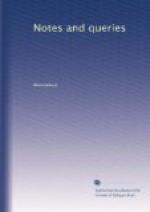To this “Query” I may as well add a “Note,” which may be interesting to some of your readers.
In Sir Roger’s MS. Journal of his persecutions by the Parliament, he states:
“It is sayd King Charles
subscribed the byll for taking away the
votes of Bishops, in y’t
very house where Christian religion was
first preached,—viz.
St. Augustines by Canterbury.”
LAMBERT B. LARKING.
Ryarsh Vicarage, Nov. 17.
* * * * *
MINOR QUERIES.
Honnore Pelle.
Who was “Honnore Pell, 1684”? My reason for asking this is, I have a marble bust of Charles II. of colossal size, most splendidly sculptured, with the long curling hair and full court dress of the period, and the execution and workmanship of which would do honour to any sculptor of the past or present time. On the stump of the arm are the name and date which I have given above, and I have in vain looked into biographical works.
W.L.
Bust of Sir Walter Raleigh.
Is there an authentic bust of Sir Walter Raleigh in existence? and if so, where is it to be found?
J.B.
Motto of University of Cambridge.
From what author, “chapter and verse,” comes the motto of the University of Cambridge, HINC LUCEM ET POCULA SAGRA? It is used as a quotation in Leighton on St. Peter’s Epistle, but in the last edition the learned editor does not give a reference.
J.J.S.
Family of Giles of Worcestershire.
Can you tell me any thing of a family named “Giles,” whose crest was a horse’s head? They were connected with Worcestershire.
*
Passage from an Old Play.
Can any of your many readers oblige me by informing me where the following very striking passage can be found? I have seen the lines quoted as from an “Old Play;” but a tolerable extensive knowledge of old plays, and a diligent search, have not hitherto enabled me to find them:—
“Call you the city gay, its revels
joyous?
They may be so to you, for you are young,
Belike and happy. She was young in
years,
But often in mid-spring will blighting
winds
Do autumn’s work; and there is grief
at heart
Can do the work of years, can pale the
cheek,
And cloud the brow, and sober down the
spirit.
This gewgaw scene hath fewer charms for
her
Than for the crone, that numbering sixty
winters,
Pronounceth it all folly.—Marvel
not
’Tis left thus willingly.”
C.A.H.
Athenaeum Club, Nov. 17, 1849.
Dalton’s Doubting’s Downfall.
About thirty years ago the following appeared in Lackington and Co.’s book catalogue: “Dalton (Edward) Doubting’s Downfall, 1_s._ 6_d._” Application was made, when other books were ordered, three several times; in each case the answer was “sold.” Since that date inquiries have been instituted from time to time, in the usual quarters, but always unsuccessfully. No clue can be given as to the size or date, but from the quaintness of the title it is presumed to be about the period of the Commonwealth.




